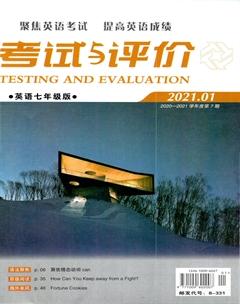Unit 2詞語和句型考點歸納
任臘梅
1. dress
dress既可以用作名詞,也可以用作動詞。
(1) dress用作名詞時,意為“連衣裙”。如:
I have an old green dress. 我有一件綠色的舊連衣裙。
(2) dress用作動詞時,意為“穿衣服”。如:
The mother dresses her baby every morning. 這位媽媽每天早上給她的嬰兒穿衣服。
The little girl cant dress herself. 這小女孩不會自己穿衣服。
【拓展】 (1) get dressed, 意為“穿上衣服”。如:
Tom always gets dressed at seven in the morning. 湯姆總是早上七點穿好衣服。
(2) be dressed in“穿著”,表示穿的狀態。如:
She is dressed in a new skirt. 她穿著一條新短裙。
(3) dress up意為“裝扮;喬裝打扮”或者“穿上盛裝;打扮”。如:
You neednt dress up for the party. 你不必為這個聚會精心打扮。
2. clean
clean既可以用作動詞,也可以用作形容詞。
(1) clean用作動詞時,意為“打掃;弄干凈”。如:
We clean our classroom every day. 我們每天打掃教室。
(2) 用作形容詞時,意為“干凈的”。如:
Her room is very clean. 她的房間非常干凈。
3. early
early既可以用作副詞,也可以用作形容詞。其反義詞是late。
(1) early用作副詞時,意為“早”。如:
She gets up early. 她起床早。
(2) early用作形容詞,意為“早的”。如:
We take the early bus every morning. 我們每天乘坐早班公共汽車。
4. exercise
exercise既可以用作動詞,也可以用作名詞。
(1) exercise用作動詞時,意為“鍛煉”。如:
My brother always exercises in the morning. 我弟弟總是在早晨鍛煉。
(2) exercise用作名詞時,意為“鍛煉;練習”。常用搭配:take exercise 做運動;do morning exercises 做早操。如:
Please take exercise every day. 請每天進行鍛煉。
Alice has lot of geography exercises to do. 愛麗絲有許多地理練習要做。
【溫馨提示】 exercise指具體運動或體操時是可數名詞,復數形式為exercises;泛指運動時是不可數名詞。
5. best
best是形容詞最高級形式,意為“最好的”,是形容詞good和well的最高級。如:
I try to do my best each day. 每天我都盡力做到最好。
She is one of the best students in our class. 她是我們班最優秀的學生之一。
6. group
group用作名詞,意為“組;群”,它是集合名詞,作主語時,若作為一個整體看待,謂語動詞用單數形式;若指具體的每個成員時,謂語動詞用復數形式。如:
They tried to form a study group. 他們試著組建一個學習小組。
A group of girls are cleaning the classroom. 一群女孩正在打掃教室。
7. taste
taste可用作系動詞,實義動詞和名詞。
(1) taste用作系動詞時,意為“嘗起來”,其后接形容詞作表語。如:
The apple tastes sweet. 這個蘋果嘗起來很甜。
(2) taste用作實義動詞時,意為“嘗,品(味道)”,后接名詞或代詞作賓語。如:
Please taste this to see if you like it. 請嘗嘗這個,看看你喜不喜歡。
(3) taste用作名詞時,意為“味道,滋味”。如:
This dish is to his taste. 這道菜合他的口味。
8. night
night用作名詞,意為“夜晚;晚上”。如:
They stay two nights at the hotel. 他們在旅館里住了兩夜。
【拓展】 (1) at night表示泛指的“在夜晚”。night 前不加冠詞,也沒有其它修飾語,后面也不接短語或其它成分。如:
He often stays up at night. 他晚上經常熬夜。
(2) in the night表示“(不具體的)某個夜晚”;后面不接其它修飾語,night 前用定冠詞the。側重于表示一個時間段,相當于during the night。如:
Jack calls me three times in the night. 杰克在夜里給我打了三次電話。
9. either
(1) either用作副詞時,意為“也”, 一般用于否定句中,置于句末,用逗號與句子其它成分隔開。如:
He doesnt come here, either. 他也沒有來這兒。
If youre not going, Im not going, either. 你不去,我也不去。
(2) either用作連詞,意為“或者”,常與or連用,構成either... or...結構,意為“要么……要么……;或者……或者……”。如:
He must be either mad or drunk. 他要么是瘋了,要么是喝醉了。
It must be either this or that. 非此即彼。
【拓展】 帶有too的肯定句變為否定句時,須將too改為either,反之亦然。如:
I have a sister, too. → I dont have a sister, either.
We arent fifteen, either. → We are fifteen, too.
【短語串串】
1. get up 起床;站起 2. brush ones teeth 刷牙 3. get dressed穿上衣服 4. have / eat breakfast 吃早餐 5. take a shower 洗澡6. radio station / show廣播電臺/節目 7. at night晚上 8. go to work去上班 9. be late for work上班遲到 10. do (ones) homework做作業 11. clean the room 打掃房間 12. take a walk散步;走一走 13. go home 回家 14. get home到家 15. lots of 大量;許多
【難句在線】
—What time do you usually eat dinner? 你通常什么時候吃晚飯?
—I usually eat dinner at a quarter to seven in the evening. 我通常在晚上六點四十五吃晚飯。
“What time...”表示對時間的提問,其同義句型還有“When...”如:
—What time do you usually get up? / When do you usually get up?你通常什么時候起床?
—I usually get up at six oclock in the morning. 我通常在早晨六點鐘起床。

